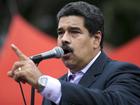In the Syrian town of Khan Sheikhun, site of an alleged chemical weapons attack, residents still mourning their dead on Friday welcomed U.S. strikes as a way to pressure Damascus.
 Full Story
Full Story
US missiles targeted Syrian forces Friday in response to a suspected chemical attack that killed up to 86 people earlier this week.
It was the first direct US strike against the government of President Bashar al-Assad in Syria's devastating six-year war.
 Full Story
Full Story
From strong messages of support to fierce condemnation, here are the main global reactions to a US strike on a Syria air base in response to a suspected chemical attack.
- Against -RUSSIA: Unsurprisingly, the main ally of Syrian President Bashar al-Assad was robust in its opposition to the strike.
 Full Story
Full Story
An air strike hit rebel-held Khan Sheikhun in northwestern Syria on Tuesday morning, leaving dozens of civilians dead from a suspected chemical weapons attack.
 Full Story
Full Story
Gently placing flowers outside a Saint Petersburg metro station to honour the 14 people killed in Monday's devastating suicide bombing, Ksenia Zashikhina ponders what might have been.
 Full Story
Full Story
Warplanes carried out a suspected toxic gas attack on a rebel-held town in northwestern Syria on Tuesday, killing at least 58 people, the Syrian Observatory for Human Rights monitor said.
 Full Story
Full Story
When America entered World War I, a century ago this week, the European powers were bogged down in a grinding trench war that had killed millions and ravaged the European continent.
Swinging its industrial might and vast manpower behind France and Britain against Germany and its allies on April 6, 1917, the United States tipped the balance of the conflict and marked its own emergence as a global power.
 Full Story
Full Story
With his popularity battered by food shortages, economic chaos and rampant crime, it is hard to understand how Venezuelan President Nicolas Maduro has clung to power.
 Full Story
Full Story
As Britain embarks on the path to Brexit with formal notification of its intention to leave the European Union, here is a short glossary to make the months of negotiations ahead a little bit less confusing:
- BrexitBorn out of the contraction of "British" and "Exit", Brexit means the UK's withdrawal from the EU.
 Full Story
Full Story
In a slick online video, 22-year-old Turkish student Ali Gul sits in front a drum kit and framed artwork while making tart remarks about Turkey's political leadership. He wraps up by musing that he'll probably get arrested if the video goes viral.
The video clocked tens of thousands of hits. This month, Gul was detained.
 Full Story
Full Story



